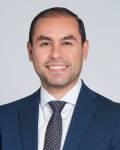Overview
Obesity is a complex chronic relapsing disease that has reached pandemic levels and requires long-term comprehensive and multispecialty management leading up to and beyond any single intervention.
Obesity multispecialty management includes weight loss interventions with the goal to improve patient’s health and overall quality of life. Dietary and lifestyle modification, pharmacotherapy and bariatric surgery have been the traditional treatments for obesity. Each modality has potential benefits and limitations, and it is not one-size fits all when managing patients with obesity. Bariatric surgery is the most effective intervention for weight loss, but <1% of patients that qualify for surgery actually undergo bariatric surgery annually. In addition, even in most successful bariatric programs, after surgery some patients may experience significant weight regain and metabolic complications. For this reason, patients need a long-term care team for management of obesity as a chronic complex disease.
Bariatric Endoscopy expands the treatment options for patients with obesity: Endoscopic Bariatric and Metabolic Therapies (EBMTs) are non-surgical, minimally invasive procedures performed using an endoscope without any scars or incisions. By using an endoscope, a small flexible tube with a camera that is introduced through the patient’s mouth into the stomach and small bowel; we are able to deliver weight loss therapies safely, leading to excellent outcomes and fast recovery.
Why Choose Cleveland Clinic
Cleveland Clinic’s Bariatric Endoscopy program offers a comprehensive range of incision-less endoscopic procedures to address various needs of patients suffering from obesity. The procedures can be used as:
- Primary therapies for patients with obesity
- Secondary treatment when patients have regained weight after bariatric surgery
- Options to address complications stemming from bariatric surgery
Our Bariatric Endoscopy team works in a multi-disciplinary fashion to provide you with world-class care for weight management, and it is in our framework to treat patients and team members like family. Our support team is dedicated and committed to providing the best experience possible for the entire program’s process as well as life-long follow up care. It is also our goal to not only help you lose weight but also help you achieve significant improvement in obesity-related medical problems (diabetes, hypertension, cardiovascular, sleep, and others) improving your overall quality of life.
What We Treat
We treat patients that suffer from obesity which is usually diagnosed with a body mass index (BMI) ≥30. Our team is ready to listen to your needs and goals, to explain and guide you through all available weight loss therapies as we walk together in this weight management journey.
We treat:
- Patients with a BMI ≥30.
- Patients who do not qualify for bariatric surgery.
- Patients who do not desire bariatric surgery.
- Patients who were deemed poor surgical candidates for bariatric surgery.
- Patients with weight regain after bariatric surgery.
- Patients who have tried other weight management therapies (diet, lifestyle modification, medications) but would like to explore endoscopic weight loss therapies.
Treatment Options
Cleveland Clinic offers multiple endoscopic bariatric and metabolic therapies (EBMTs). EBMTs include revision procedures for weight regain after bariatric surgery and primary endoscopic procedures for weight management.
- Primary Endoscopic Procedures for Weight Management:
- Gastric Remodeling: Endoscopic Sleeve Gastroplasty (ESG) procedure. By using an endoscope through the mouth, the stomach is sutured to shrink its size and restrict the amount of food that it can hold, hence giving excellent weight loss and giving the patient satiety after a meal
- Space Occupying devices: Intragastric Balloon placement. By using an endoscope, a silicone balloon is placed in the stomach, which limits the amount of food that the stomach can hold and delays the empty of food out of the stomach, hence giving great weight loss to the patient.
- Aspiration therapy. With the endoscope, a small tube is placed in the stomach, and the tube’s exterior port is placed in the abdomen. The device facilitates the removal of some calories after a meal giving great weight loss to the patient.
- Small bowel therapies: Bypass liners and Duodenal Resurfacing options (clinical trials only).
- Secondary Endoscopic Revision Procedures for Weight Regain After Prior Bariatric Surgery:
- Transoral Outlet Reduction (TORe) procedure: This procedure is an endoscopic revision procedure for patients who have had a gastric bypass, now have a stretched or dilated gastric outlet/pouch, and suffer from weight regain. By using an endoscope and through the mouth of the patient, the gastric outlet is tightened with endoscopic sutures.
- Argon plasma coagulation (APC) procedure: For gastric bypass patients with weight regain. By using an endoscope and a laser, the gastric outlet is shrank in size in one or more sessions.
- Endoscopic Sleeve-in-Sleeve procedure: This procedure is an endoscopic revision procedure for patients who have had a sleeve gastrectomy, now have a stretched or dilated gastric sleeve stomach, and suffer from weight regain. By using an endoscope and through the mouth of the patient, the sleeve is tightened with endoscopic sutures and decreased in size again.
- Endoscopic Management of Bariatric Complications:
- Our comprehensive program offer management of:
- Gastrojejunal anastomosis strictures/stenosis in gastric bypass patients.
- Gastric Sleeve stenosis.
- Marginal anastomotic ulceration (Medical and Endoscopic management)
- Gastro-gastric fistula (GGF) or other post-bariatric surgery gastrointestinal fistulas.
- Biliary problems in Gastric Bypass: Endoscopic Ultrasound-Directed Transgastric ERCP (EDGE) procedure.
- For Endoscopy needed in the excluded/remnant stomach: Gastric Access Temporary for Endoscopy (GATE) procedure.
- Dumping syndrome: Lifestyle interventions, Medical management and Endoscopic management (Endoscopic revision of gastric bypass).
- Post-Bariatric Surgery Leaks or fluid collections: Endoscopic management, drainage, stents, pigtails, suturing/closure, endo-VAC therapy, over-the-scope clips (OTSC) and others.
What to Expect
Patients start the program with a clinic visit with the bariatric endoscopy physician and our specialized bariatric dietitian. After the initial assessment during the clinic visit, patients are guided through the most appropriate pathway for the desired weight loss therapy. Patients also meet with the program’s nurse coordinator at the initial clinic visit who assist patients throughout the entire process.
Meet Our Team
Advanced and Bariatric Endoscopist

Roberto Simons-Linares, MD
Director of Bariatric Endoscopy
Bariatric Dietitians

Bailey Flora, RD
Lead Dietitian Bariatric Endoscopy
Program’s Coordinator

Dianne Whitt, RN
Nurse Coordinator
Behavioral Therapy
Administration Assistance

Heather Anderson
Program Administration
Financial Assistance
Our program is integrated in the institution’s weight management multidisciplinary team and we work together with bariatric surgeons, obesity medicine specialist, psychologist, endocrinologist, cardiometabolic specialist, nutrition, sleep medicine, exercise physiologist, hepatologist, wellness preventive medicine, and more.
Appointments
- Call 216.444.6149 to schedule an appointment.
- Our office is located at Cleveland Clinic Main Campus.
Resources
Podcasts
- Cleveland Clinic podcast Butts and Guts explores your digestive and surgical health from end to end. You’ll learn how to have the best digestive health possible from your gall bladder to your liver and more from our host, Colorectal Surgery Chairman Scott Steele, MD.
- All About Cleveland Clinic's Bariatric Endoscopy Program
Patient Stories
Consult QD physician blog